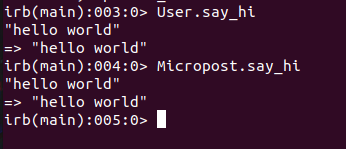Một vài cách để DRY code trong Rails
Bài đăng này đã không được cập nhật trong 6 năm
Thuật ngữ DRY chắc không còn xa lạ lắm với các lập trinh viên, và có lẽ nó cũng là 1 nguyên tắc phát triển phần mềm mà các coder phải nên biết vì các lợi ích của nó mạng lại là không hề nhỏ.
DRY là gì ?
DRY thực chất là viết tắt của câu :
Don’t Repeat Yourself
Hiểu nôm na là chúng ta không nên lặp lại code
Lợi ích DRY mang lại :
- Dễ bảo trì, mở rộng code : Khi chúng ta maintain code có lẽ ai cũng muốn chỉ cần tìm 1 ví trí nút thắt duy nhất để có thể giải quyết toàn bộ 1 issue thay vì chúng ta phải ctrl + shift + F đi mò từng file để sửa hoặc viết những đoạn code giống nhau không ạ

- Hạn chế bị bug: Nếu chúng ta copy 1 đoạn code từ chỗ này qua chỗ kia và đến 1 ngày chúng ta phải sửa hết đống code tha đi khắp nơi ấy mà chẳng may lại bị sót mất chỗ nào thì sao
 ?
?
Ví dụ :
Chúng ta đi vào 1 ví dụ quen thuộc trong rails:
class MicropostsController < ApplicationController
def show
@micropost = Micropost.find_by id: params[:id]
...
end
def edit
@micropost = Micropost.find_by id: params[:id]
...
end
def update
@micropost = Micropost.find_by id: params[:id]
...
end
Chúng ta có thể thấy @micropost = Micropost.find_by id: params[:id] được lặp đi lặp lại ở các methods cảm giác "not cool at all" đúng không ạ.
Để giải quyết thì chúng ta đơn giản là dùng before_action :
class MicropostsController < ApplicationController
before_action :load_micropost, only: [:show, :edit, :update]
def show
...
end
def edit
...
end
def update
...
end
private
def load_micropost
@micropost = Micropost.find_by id: params[:id]
end
Đó tuy năng suất và hiệu suất vào như thế nhưng giờ nhìn code thoáng hơn rồi.
Note: before_action thực ra là 1 method được định nghĩa ở AbstractController::Callbacks::ClassMethods
Module Concern
Gom nhóm các phương thức có thể dùng chung trong nhiều class hoặc module vào chung 1 module và include vào các class hoặc module cần dùng.
Từ phiên bản Rails 4 chúng ta được cung cấp 2 folder:
- app/controllers/concerns/
- app/models/concerns/
Là nơi định nghĩa các phương thức được dùng chung trong nhiều controller hoặc nhiều model (Cái này thuộc về cách tổ chức file thôi chứ không nhất thiết tất cả các phương thức dùng chung phải bắt buộc định nghĩa ở đây ví dụ chúng ta hoàn toàn có thể include UsersHelper trong MicropostsController nhưng nghe vẻ hơi "dây mơ rễ má")
Mẫu module concern:
module M
extend ActiveSupport::Concern
included do
scope :disabled, -> { where(disabled: true) }
end
class_methods do
...
end
def example
end
...
end
included: là 1 callback được gọi ngay khi module concern này được include vào class hoặc module khácclass_methods: nơi define các class method được include vào class/module khácexample: là các instance method được include vào class/module khác
Ví dụ:
app/models/concerns/common_methods.rb :
module CommonMethods
extend ActiveSupport::Concern
included do
scope :create_asc, -> { order created_at: :asc }
end
class_methods do
def say_hi
p "hello world"
end
end
def a_instance_method
p "i'm .... instance method (slap finger)"
end
end
app/models/user.rb :
class User < ApplicationRecord
include CommonMethods
end
app/models/micropost.rb :
class Micropost < ApplicationRecord
include CommonMethods
end
Kết quả :




Phương thức send()
Đây là 1 trong những phương thức rất hay ho trong metaprogramming. Và mình nghĩ là metaprogramming được sinh ra là để giúp đỡ lặp lại code.
Phương thức send thực hiện 1 lời gọi hàm đền 1 phương thức với tham số truyền vào là 1 string, 1 block hoặc 1 symbol
Ví dụ :
class Person
def initialize name
@name = name
end
# def hello
# if @name == "dad"
# hello_dad
# elsif @name == "mom"
# hello_mom
# elsif @name == "sister"
# hello_sister
# else
# p "Hello"
# end
# end
def hello
if !@name
puts "Hello"
else
send "hello_#{@name}"
end
end
private
def hello_dad
p "Hi Dad!"
end
def hello_mom
p "Hi Mom!"
end
def hello_sister
p "Hi Sister!"
end
end
Person.new("dad").hello
# => "Hi Dad!"
define_method
Trong trường hợp chúng ta cần định nghĩa nhiều methods có độ tương tự cao ví dụ :
Ví dụ :
class Micropost < ApplicationRecord
enum status: { pending: 0, approve: 1, cancel: 2}
class << self
# def microposts_pending
# pending.where(content: "pending")
# end
# def microposts_approve
# approve.where(content: "approve")
# end
# def microposts_cancel
# cancel.where(content: "cancel")
# end
Micropost.statuses.keys.each do |status|
define_method "microposts_#{status}" do
send(status).where(content: status)
end
end
end
end

Tổng kết
Tài liệu tham khảo
https://api.rubyonrails.org/classes/ActiveSupport/Concern.html
https://viblo.asia/p/tim-hieu-ve-metaprogramming-trong-ruby-djeZ1G4Q5Wz
All rights reserved